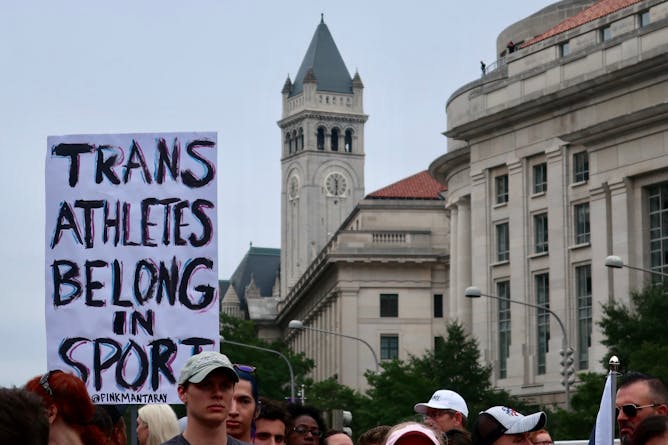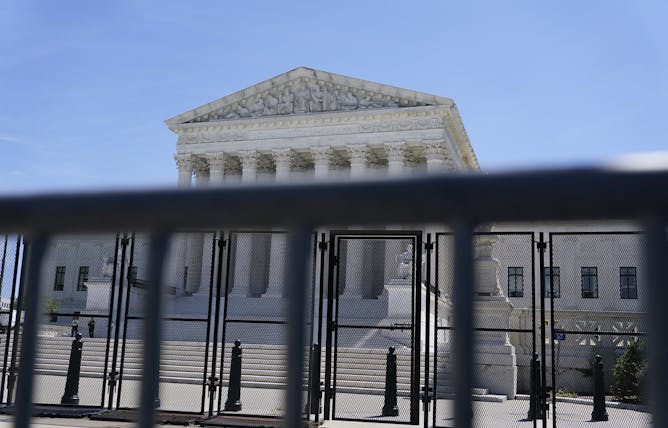|
A tsunami of intolerance has engulfed the sporting world. Wave after wave of prejudice continues to make equitable sports participation difficult, and the most recent news heaves trans athletes of all ages overboard into a swirling current of exclusion and stigmatization.
Today in The Conversation Canada, Macintosh Ross of Western University and Matthew R. Hodler from the University of Rhode Island write about shocking and exclusionary measures across sport internationally and in the U.S.
They argue that state lawmakers — like those in Oklahoma and Ohio — who advocate for laws excluding trans athletes are to some degree supported by sports’ outdated, sex-based binary fields of competition.
Ross and Holder conclude by saying none of the laws that “protect women’s sport” actually address the widespread issues in women’s sport — for example, that lawmakers and governing bodies aren’t actively ensuring or promoting equitable access to facilities and other resources. Instead, they’re choosing to target trans women.
Also today:
Regards,
|

|
Haley Lewis
Culture + Society Editor | Producer, Don't Call Me Resilient
|
|

Over two dozen states have banned transgender youth from playing sports corresponding to their identity since 2021.
(Shutterstock)
MacIntosh Ross, Western University; Matthew R. Hodler, University of Rhode Island
Lawmakers and governing bodies aren’t actively ensuring or promoting equitable access for women and girls. Instead, they’ve chosen to target trans women.
|

The U.S. Supreme Court is seen behind security fencing on June 28, 2022.
(AP Photo/Mariam Zuhaib)
Matthew Lebo, Western University; Ellen Key, Appalachian State University
The combination of crumbling democratic norms in the U.S. Supreme Court appointments process and an ideological court out of step with mainstream America raises questions of how it could be reformed.
|

Future transportation design should address inequality and not exacerbate it.
(Shutterstock)
Burcu Olgen, Concordia University; Fatima Mehrzad, Concordia University; Negarsadat Rahimi, Concordia University; Sara El Khatib, Concordia University
Moving around cities will change in the future as new technologies like self-driving cars gain wider adoption. Science fiction can give us a glimpse into these futures.
|

Sports may offer a strategy to re-integrate young people involved in violent activities back in to society.
(Shutterstock)
Umair Asif, Université du Québec à Montréal (UQAM); Simon Rosenbaum, UNSW Sydney; Tegwen Gadais, Université du Québec à Montréal (UQAM)
Sports can help prevent the involvement of youth in violent extremism.
|
La Conversation Canada
|

Plusieurs articles scientifiques font maintenant état des résultats positifs et des conséquences à long terme d’une transplantation pancréatique pour guérir le diabète.
(Shutterstock)
Maria Galipeau, Université de Montréal
Une nouvelle étude présente les résultats à long terme d’une greffe de pancréas pour traiter les personnes atteintes de diabète de type 1. La guérison du diabète est peut-être à portée de la main.
|
Ukraine Invasion
|
-
Carole Nakhle, University of Surrey
Even before the war, Moscow was acknowledging the problems in its energy industry.
|
|
Arts
|
-
Michael David Barbezat, Australian Catholic University
The latest season of 'Stranger Things' features a town in the grip of a panic about satanic conspiracy. This reflects the very fears that existed in 1980s America, which still exist in different forms today.
|
|
Health
|
-
Caroline A B Redhead, University of Manchester; Jackson Kirkman-Brown, University of Birmingham; Leah Gilman, University of Manchester; Lucy Frith, University of Manchester
Previously, eggs and sperm (gametes) and embryos were typically only stored for a maximum of ten years.
|
|
Politics
|
-
Chris Changwe Nshimbi, University of Pretoria
The AU needs to address two main problems to steer Africa into a prosperous future – the use of unconstitutional means by some leaders to cling to power and disregard for the rule of law.
|
|
|
|
| |
| |
| |
| |
|
|